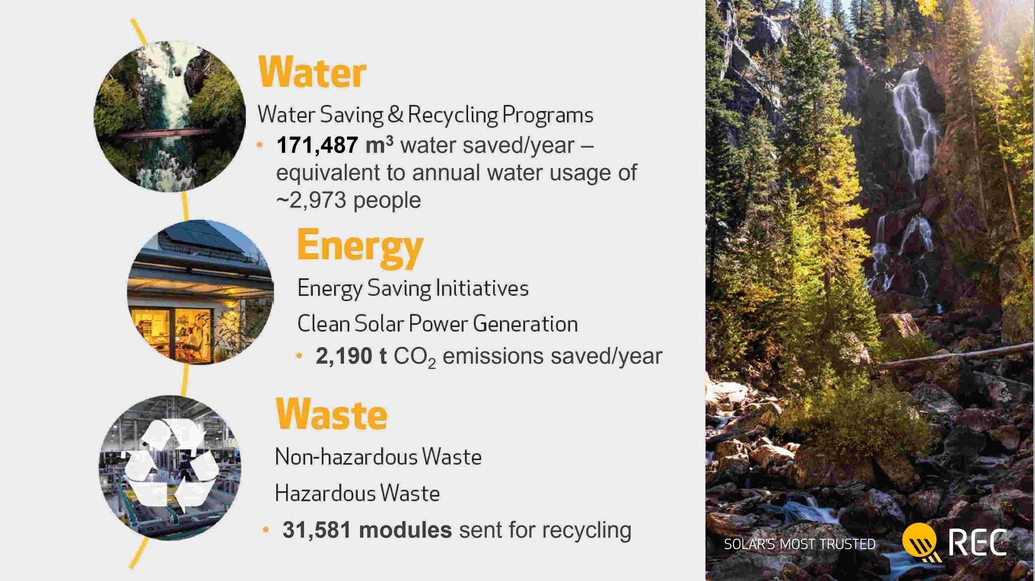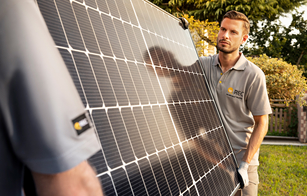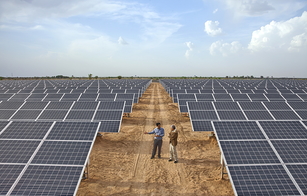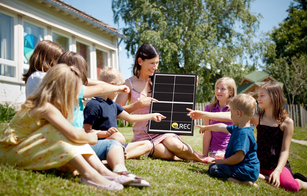Help conserve water by choosing solar panels that are responsibly made
The energy supply sector is currently the largest contributor to global greenhouse gas emissions. It is responsible for approximately 35% of total emissions with residential and commercial buildings consuming over half of all electricity.1 Despite the fact that clean energy sources like solar panels can reduce a household's carbon footprint, it's crucial to recognize that the production of goods and services used in a household also contributes to an environmental footprint, including the manufacturing of solar panels.
Water plays a key role in solar panel manufacturing
The production of solar panels is resource-intensive, involving the use of precious materials such as copper, silicon, and glass. This process consumes significant amounts of energy and water, the latter being an extremely valuable natural resource. Water plays a vital role throughout the solar photovoltaic panel supply chain:
- starting from the purification of silicon, the base material for solar cells,
- followed by slicing silicon ingots, large blocks of high-purity crystalline silicon, into thin wafers
- and various treatment processes of wafers and solar cells,
- over to the final module assembly.
In particular, the first steps from above are energy and heat intensive and require intensive water usage for cooling. It is important to note that the water intensity of solar panel manufacturing can vary depending on the technology and manufacturing practices.
We must conserve and reuse water as much as possible

With climate change impacting on global rainfall2, water is a globally important resource we must conserve or reuse as far as possible. Socially responsible manufacturers, including those in the solar panel manufacturing industry, are actively seeking ways to conserve and recycle water, recognizing its increasing scarcity.
Having robust environmental, social, and governance (ESG) policies, along with responsible manufacturing practices, allows responsible manufacturers to minimize their impact on the environment.
Robust savings programs in the production are driving a more sustainable transition
Continuously driving energy, water, and waste savings programs, REC Group has set ambitious goals for its manufacturing facility in Singapore, a country known for its responsible and sustainable manufacturing practices, where REC produces solar panels that are exported to the world.
The commitment includes reducing water consumption from the production of solar cells by 5% and for rooftop solar panels by 10% by 2024. In line with Singapore's water scarcity, REC ensures that water used during manufacturing processes is treated and recycled, significantly reducing the overall environmental impact. Besides having measures in place to use water responsibly during its production, actions have been taken to reduce its water consumption.

Through REC's focus on responsible manufacturing, specific water consumption decreased from 761 m³ per MW of solar panels produced in 2021 to 628 m³ per MW in 2022, representing a notable 17.5% reduction. This translates to an annual water saving of approximately 171,487 m³, equivalent to the water usage of close to 3,000 people in Singapore. Future plans involve optimizing wastewater recycling, with projected savings of 131,400 m³ per year upon full implementation.
In addition to responsible water management, REC actively harvests rainwater for use in cooling towers after filtration. By investing in stormwater collection facilities, REC aims to increase rainwater harvesting capabilities, projecting water savings of about 10,000 m³ per year.
Beyond designing solar panels with the environment in mind, implementing responsible manufacturing practices, such as reducing the use of water and energy and minimizing the production of any harmful waste, are key issues that the solar industry needs to address to build a more sustainable future.
Homeowners who want to play their part in mitigating climate change can choose responsibly made solar panels as a tangible way to make a greater positive impact and lower more their environmental footprint.
This article is part of REC’s series on how to choose solar panels more responsibly. Previously published articles are available here:
Reduce Waste
Higher Power- Lower Footprint
See how REC is contributing towards a better tomorrow today: www.recgroup.com/csr
1 https://www.un.org/en/actnow/facts-and-figures
2 https://www.epa.gov/climate-indicators/climate-change-indicators-us-and-global-precipitation#:~:text=Just%20as%20precipitation%20patterns%20vary,areas%20to%20experience%20decreased%20precipitation







